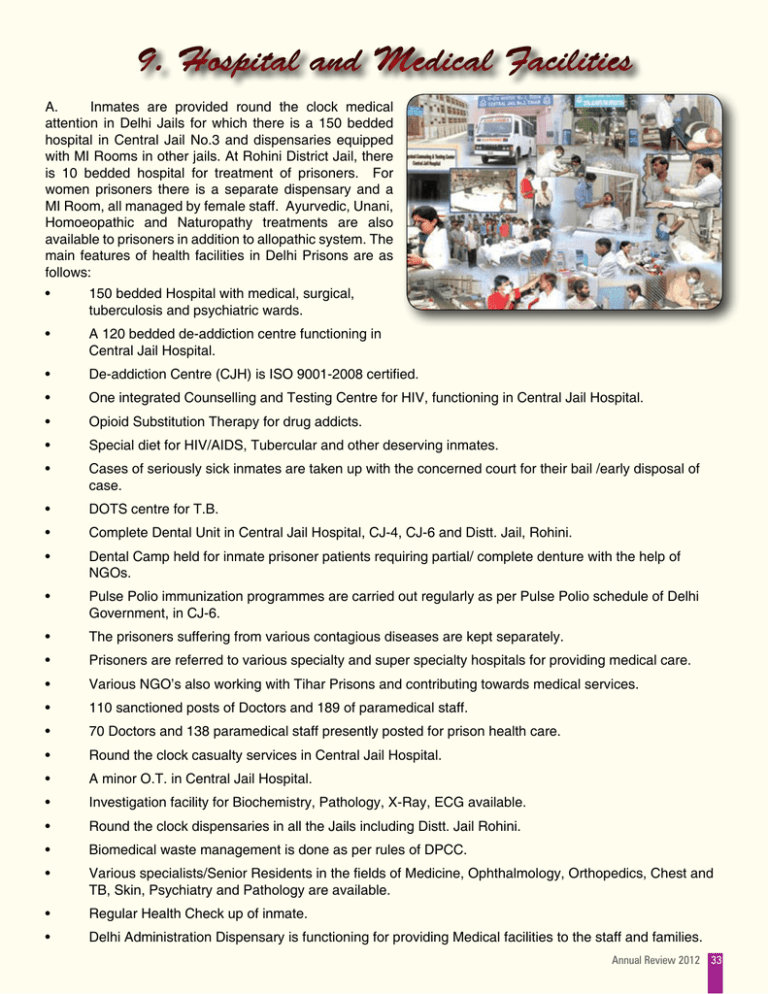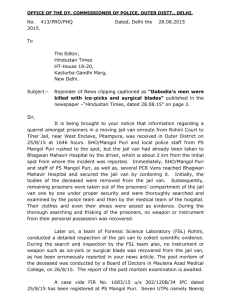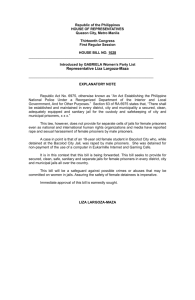9. Hospital and Medical Facilities
advertisement

9. Hospital and Medical Facilities A. Inmates are provided round the clock medical attention in Delhi Jails for which there is a 150 bedded hospital in Central Jail No.3 and dispensaries equipped with MI Rooms in other jails. At Rohini District Jail, there is 10 bedded hospital for treatment of prisoners. For women prisoners there is a separate dispensary and a MI Room, all managed by female staff. Ayurvedic, Unani, Homoeopathic and Naturopathy treatments are also available to prisoners in addition to allopathic system. The main features of health facilities in Delhi Prisons are as follows: • 150 bedded Hospital with medical, surgical, tuberculosis and psychiatric wards. • A 120 bedded de-addiction centre functioning in Central Jail Hospital. • De-addiction Centre (CJH) is ISO 9001-2008 certified. • One integrated Counselling and Testing Centre for HIV, functioning in Central Jail Hospital. • Opioid Substitution Therapy for drug addicts. • Special diet for HIV/AIDS, Tubercular and other deserving inmates. • Cases of seriously sick inmates are taken up with the concerned court for their bail /early disposal of case. • DOTS centre for T.B. • Complete Dental Unit in Central Jail Hospital, CJ-4, CJ-6 and Distt. Jail, Rohini. • Dental Camp held for inmate prisoner patients requiring partial/ complete denture with the help of NGOs. • Pulse Polio immunization programmes are carried out regularly as per Pulse Polio schedule of Delhi Government, in CJ-6. • The prisoners suffering from various contagious diseases are kept separately. • Prisoners are referred to various specialty and super specialty hospitals for providing medical care. • Various NGO’s also working with Tihar Prisons and contributing towards medical services. • 110 sanctioned posts of Doctors and 189 of paramedical staff. • 70 Doctors and 138 paramedical staff presently posted for prison health care. • Round the clock casualty services in Central Jail Hospital. • A minor O.T. in Central Jail Hospital. • Investigation facility for Biochemistry, Pathology, X-Ray, ECG available. • Round the clock dispensaries in all the Jails including Distt. Jail Rohini. • Biomedical waste management is done as per rules of DPCC. • Various specialists/Senior Residents in the fields of Medicine, Ophthalmology, Orthopedics, Chest and TB, Skin, Psychiatry and Pathology are available. • Regular Health Check up of inmate. • Delhi Administration Dispensary is functioning for providing Medical facilities to the staff and families. Annual Review 2012 33 B. Treatment of drug users and HIV prevention 8 to 10% of prisoner population at the time of admission in the prison are drug addicts. Delhi Prisons have taken a major initiative in the field of management of drug abusers/ addicts by setting up a 120 bedded De-addiction Centre (DAC). All inmates, who are reported to be drug addicts, are identified on the very first day of their admission and directly sent to DAC where they are initially treated for withdrawal symptoms and after the detoxification process is over, they are sent to rehabilitation wards for counselling. Opioid Substitution Treatment (OST) was launched for the first time in any prison in South Asia to treat drug users at Drug De-Addiction Centre. Total 4261 prisoners were treated at DAC during the year. Further, Delhi Prisons are considered best in taking measures to prevent HIV with the opening of Integrated Counseling & Testing Centre (ICTC). A sizeable percentage of inmates are drug dependents who indulge in high risk behavior for transmission and spread of HIV, e.g., Injectable Drug users/ illicit and unsafe sexual relationships etc. at the place of their habitation. Further, a number of prisoners attend medical facilities only in Prisons and never outside. The main purpose behind setting of ICTC was to identify the HIV positive prisoner. Earlier, prisoners were being referred to outside hospitals for counseling, screening and testing HIV and with the introduction of this facility in the Prison, the health status of a prisoner is taken care of from the beginning of his admission to the prison. During the year, 1349 inmates were counselled and tested for HIV in the ICTC Centre. Out of this number, 115 prisoners were found to be HIV + ve. of which 79 prisoners, were injectable drug users (IDU). At present 115 HIV +ve prisoners are lodged in Delhi Jails. C. POLICY FOR OUTSIDE MEDICAL REFERRALS The prison department has formulated the policy under which all the inmate patients are first treated at the Dispensary of the respective jails/central jail hospital and, if need be, referred to Deen Dayal Upadhyay Hospital which is a first referral hospital for Tihar inmates. Similarly, Baba Saheb Ambedkar Hospital (BSA) is the first referral hospital for prisoners lodged at District Jail, Rohini. The prisoner can be referred to other Government hospitals only after recommendation/referral of DDU/BSA Hospital. This has streamlined the medical administration and unnecessary referrals to outside hospitals have been curtailed thereby saving on unnecessary expenditure and human effort in escorting them to for flung hospital. Every effort is made to maintain the low mortality rate amongst prisoners. The best possible medical facilities are provided to the prisoner inside the Prison or by referring them to Specialty or Super Specialty Hospital. Most of the prisoners are from the lower income strata of society where various type of diseases are prevalent. 34 Annual Review 2012




